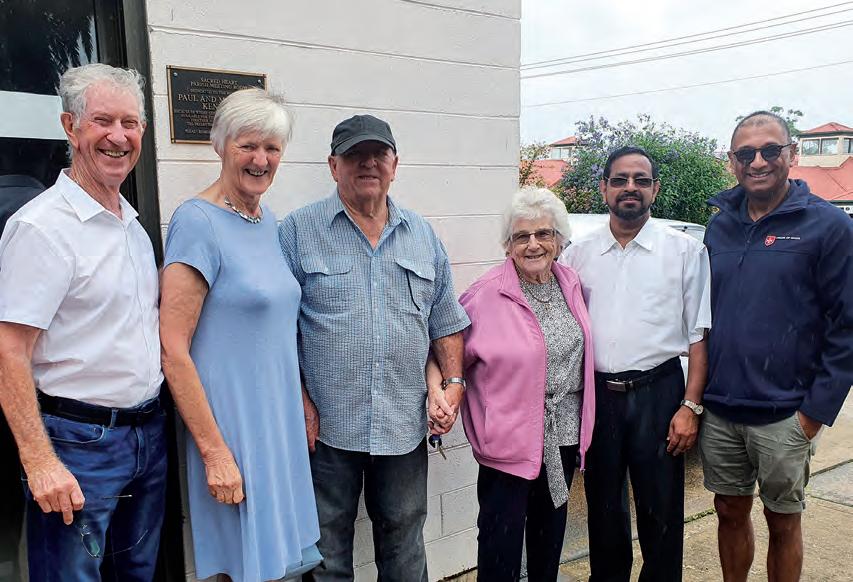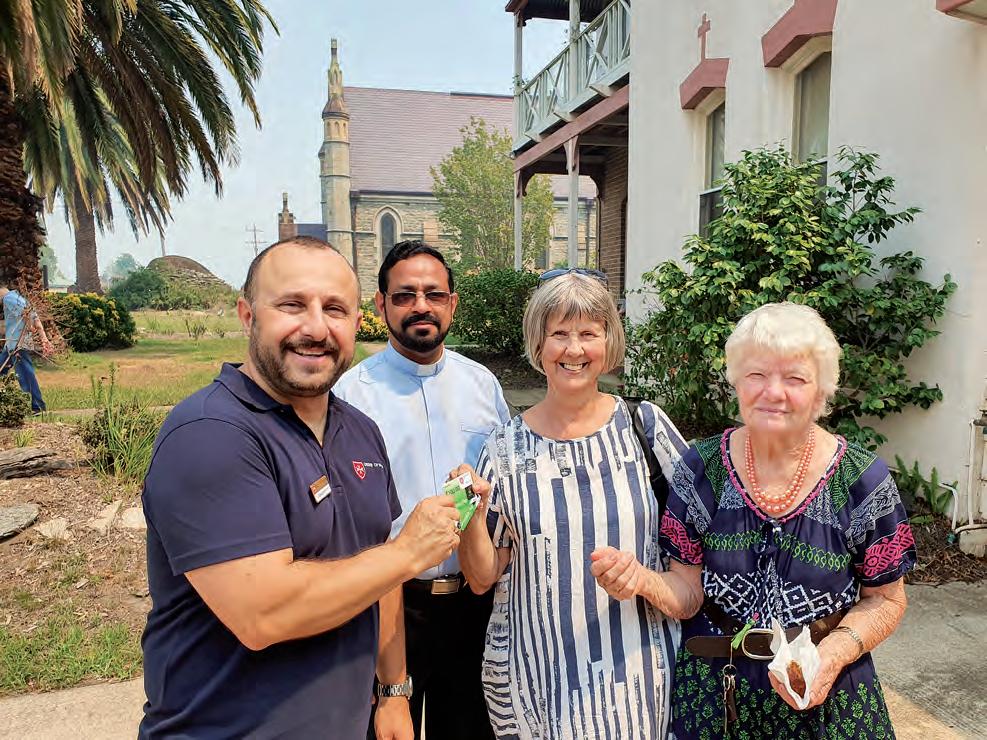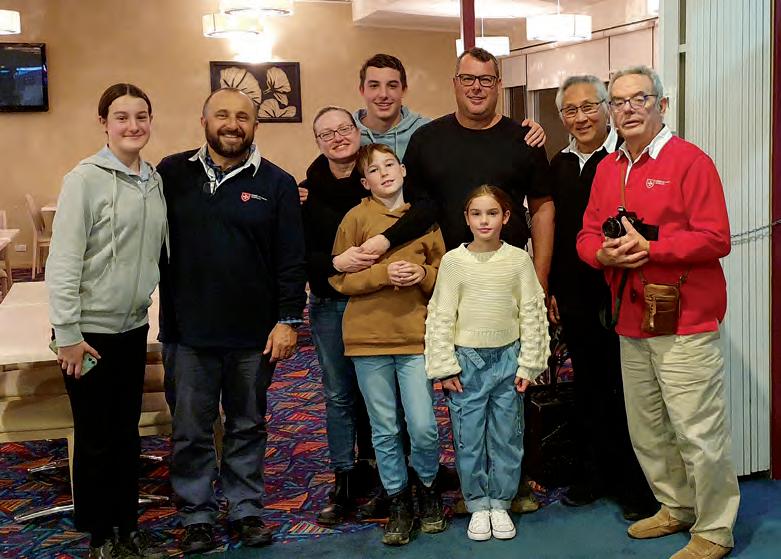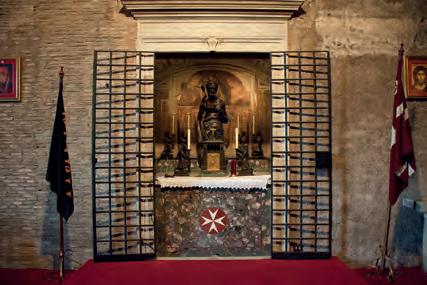
6 minute read
BLACK SUMMER Recapping two years of service
The summer of 2020 will forever remain etched in the memories of many of the people who reside on the south coast of NSW. Now colloquially known as the ‘Black Summer’ bushfires, many people watched in fear as the fires burnt towards their towns and homes. Fires that were described as a ‘roaring train’ and ‘fireball’ by the people who survived them. Locals described the fear that they felt watching the fires around the clock for days leading up to the destruction – hoping that they will turn from their homes and towns and move in an opposite direction. Then the terror that was the realisation that the fire was heading towards them, and that they then had very little time to get their valuables and belongings and leave their homes for safety. They had to decide, in some cases, in a matter of minutes what belongings they were going to take and what things they had to leave behind. Some were unable to evacuate livestock and family pets, and had no option but to destroy their fences and set their animals free, hoping that they would make their own way to safety.
The residents of Conjola Park NSW described their horror as the fires jumped the highway with ease and headed towards their secluded little town. Some of the ladies of the town told us of how they very quickly found themselves surrounded by the flames and had no way of escape other than to run down to the lake and dive into the water to save themselves. Many of the locals made their way out to the middle of the lake to the safety of an anchored pontoon. Weeks before, children played on this pontoon, jumping into the cool waters of the lake. Now this pontoon was their island refuge while they tried to escape the horror that was about to change their lives forever. Many described clinging to this pontoon, hearing the roar of the fire as it consumed their homes. They watched animals trying to escape the flames – kangaroos on fire hopping out of the burning bush and into the water to extinguish themselves. Snakes swimming past them to make it to the other side of the lake to safety. The air was hot and dry, and the smoke was so thick that they couldn’t see their hands in front of their faces. They couldn’t breathe – all of the oxygen was consumed by the flames. As they held onto the pontoon, they immersed their heads into the cool water to keep their hair from burning. Embers of burning ash fell onto their hair, the tops of their hands, and any parts of them that were exposed. Many showed me the burns on the back of their hands, and described how grateful they were to have survived. They left the water to find 89 homes destroyed.
Houses were reduced to rubble. Many homes, having been built originally as weekenders, were made from timber. They didn’t stand a chance. We saw solid rivers of metal that were once aluminium gutters and downpipes, and likewise solidified rivers of glass from windows that had melted in the extreme heat.
Others lost more than homes. Some told me of encounters with lifelong friends the day preceding the home and business, but then suffered the devastation of flooding in the months that followed that damaged their newly built home again. only of losing friends, but their homes, their belongings, their clothes, their food, their valuables, everything. Many were retirees. How does one start life again when you are in your seventies and now have nothing but the clothes that you are wearing? Where do you go to sleep that night? How do you feed and clothe your family?
Opposite Page: A burnt vehicle on a property near Moruya. Many families lost not only their homes, but their vehicles, farming equipment, businesses and livestock. This page, from top: Confrère Frank Testa delivers a large Christmas hamper to a family of six in Mogo December 2021; Confrère Dunstan De Sousa (right) with Fr. George and his parishioners in Moruya after Sunday morning Mass.

An hour’s drive further down the coast in the towns of Mogo and Broulee the fires had caused similar devastation. One family told us of how they had sold their home in the southern suburbs of Sydney to escape the rat race and raise their young family in a more simple way in the country. Their property in the bush was a fresh start. In the excitement of the move of selling their home, buying some land and building a new home, they parents with four beautiful young children. Twin brothers told us of how they lost their home as children in Victoria during the Ash Wednesday bushfires. Now older gentlemen, they moved to NSW to start again and were doing quite well in Broulee, until the Black Summer fires came through, destroying their home and property. Luckily they were insured – a lesson learnt from surviving the first bushfire that robbed their family of everything.
Another family that we met lost their home and their business located next door. They were grateful that they saved their animals and were able to start again in the same town with the insurance money and the help of charity organisations and government grants. Friends of theirs not only lost their that were needed to survive in the time directly after the fires, and then for ongoing support of the local population in the grieving and rebuilding in the months ahead.

We immediately contacted the local parish priests and community leaders. They directed us to some of the families that needed our support the most. Our initial team of four members made monthly visits to the South Coast offering assistance and support to those families who had suffered so greatly. We were grateful for the support of two other members from Canberra who joined us in Moruya and Bateman’s bay.
During our monthly visits, we would call in on families who had to rebuild their lives and offer our friendly support and encouragement. This meant a lot to these families to know that someone outside of their community was willing to regularly travel up to five hours to visit them and check in on their welfare.
We were also involved in special projects need in the Conjola area – that of men’s mental health. Many women coming to the centre told of their concerns for their husbands and sons who attempted to defend their homes in the fires, and who were suffering the mental anguish of losing their homes and businesses, and viewed themselves as failures. The Order of Malta members coordinated a number of men’s mental health events that were well supported by the local community. Thirty men gathered in Milton for a men’s BBQ in November 2020 that was hosted by the Order of Malta, and a similar turn out came along to a men’s Mental Health dinner at the Conjola Bowling club in May 2021 where guest speakers, psychiatrist Dr. Tad Tietze and author Stuart O’Neill (‘Just One Reason’) addressed the audience from both a clinical and personal perspective of mental wellbeing and suicide. The night was also supported by the local mental health team who were present to make contact with the men of Conjola and offer their ongoing professional services if needed.

The Order of Malta team members regularly checked in for Masses at Bateman’s Bay Parish and Moruya Parish to the delight of respective parish enthusiasm for visiting our friends and families that we the usual ‘happiness’ of the season was lacking due to the psychological and financial stresses of rebuilding.
I would like to take this opportunity to thank Confrères Stephen Gatt, Daniel Kwok, Dunstan de Souza, Peter Evans, and Tom Walker for their enthusiasm towards this project – for their time, their financial support and commitment. I would also like to thank their respective families for releasing them for a weekend each month to participate in these visits. I would also like to thank our national Hospitaller John Murphy who was only a phone call away in offering any assistance, and National President James Douglas for his never-ending support of the project.
On a personal level, I particularly enjoyed our team’s camaraderie and fellowship over this time. The project allowed us to spend time with each other, not only in the good works of the Order, but in fraternal prayer and reflective discussions at both the retreat centre where we stayed in and during the long car rides together when we ‘hit the road’. Our project is now coming to an end, but it has ensured that the Order of Malta has made an everlasting impression in many lives and parishes on the South Coast of NSW.
Adding To Your Knowledge Of The Order Of Malta











